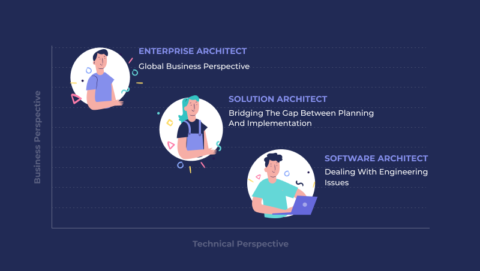Understanding the Role of a Solution Architect
In the realm of software development and IT projects, a key role that plays a crucial part in designing and implementing effective solutions is that of a Solution Architect. In this article, we will delve into the responsibilities, skills, and importance of a Solution Architect, and explore why this role holds significant value in the success of IT projects.
Defining the Role of a Solution Architect
A Solution Architect is an experienced professional who bridges the gap between business requirements and technical implementation. They are responsible for designing, planning, and overseeing the development of robust, scalable, and efficient solutions that align with the organizations goals and meet client needs. Solution Architects possess a deep understanding of both business processes and technical aspects, enabling them to create comprehensive solution designs.
Responsibilities of a Solution Architect
The role of a Solution Architect encompasses various responsibilities, including:
- Collaborating with stakeholders to gather and analyze business requirements.
- Designing and documenting solution architectures that align with business objectives.
- Evaluating and selecting suitable technologies, frameworks, and platforms.
- Creating technical specifications and overseeing the development process.
- Ensuring compliance with architectural standards and best practices.
- Conducting risk assessments and providing mitigation strategies.
- Mentoring and guiding development teams throughout the implementation phase.
- Continuously evaluating and optimizing solutions for performance and scalability.

Skills and Qualifications of a Solution Architect
To excel in the role of a Solution Architect, individuals require a diverse set of skills and qualifications, including:
- Strong technical expertise across multiple technologies and domains.
- Proficiency in software development methodologies and architectural patterns.
- Excellent analytical and problem-solving skills.
- Effective communication and stakeholder management abilities.
- Leadership and team collaboration skills.
- Business acumen and understanding of organizational goals.
Advantages of Having a Solution Architect
- Efficient and Scalable
- JavaScript Everywhere
- Vast Ecosystem
- High Performance
- Real-time Communication
- Microservices Architecture
- Developer Productivity
Why the Role of a Solution Architect Matters
The role of a Solution Architect holds significant importance in IT projects for various reasons: A. Bridging the Gap: Solution Architects act as a bridge between business stakeholders and technical teams, ensuring that the solution addresses business needs while leveraging appropriate technologies. B. Ensuring Quality and Consistency: Architects establish and enforce architectural standards, promoting quality, consistency, and maintainability across projects. C. Long-Term Vision: Solution Architects take into account the long-term vision of the organization and design solutions that can support future growth and scalability.
“A solution architect designs comprehensive and scalable solutions that address complex business problems and align with the organizations goals and technical requirements.”
The Value of a Skilled Solution Architect
In conclusion, the role of a Solution Architect is integral to the success of IT projects. They bring together technical expertise, business acumen, and strategic thinking to design solutions that align with organizational goals. With their ability to bridge the gap between business and technology, Solution Architects play a vital role in creating efficient, scalable, and future-proof solutions.

